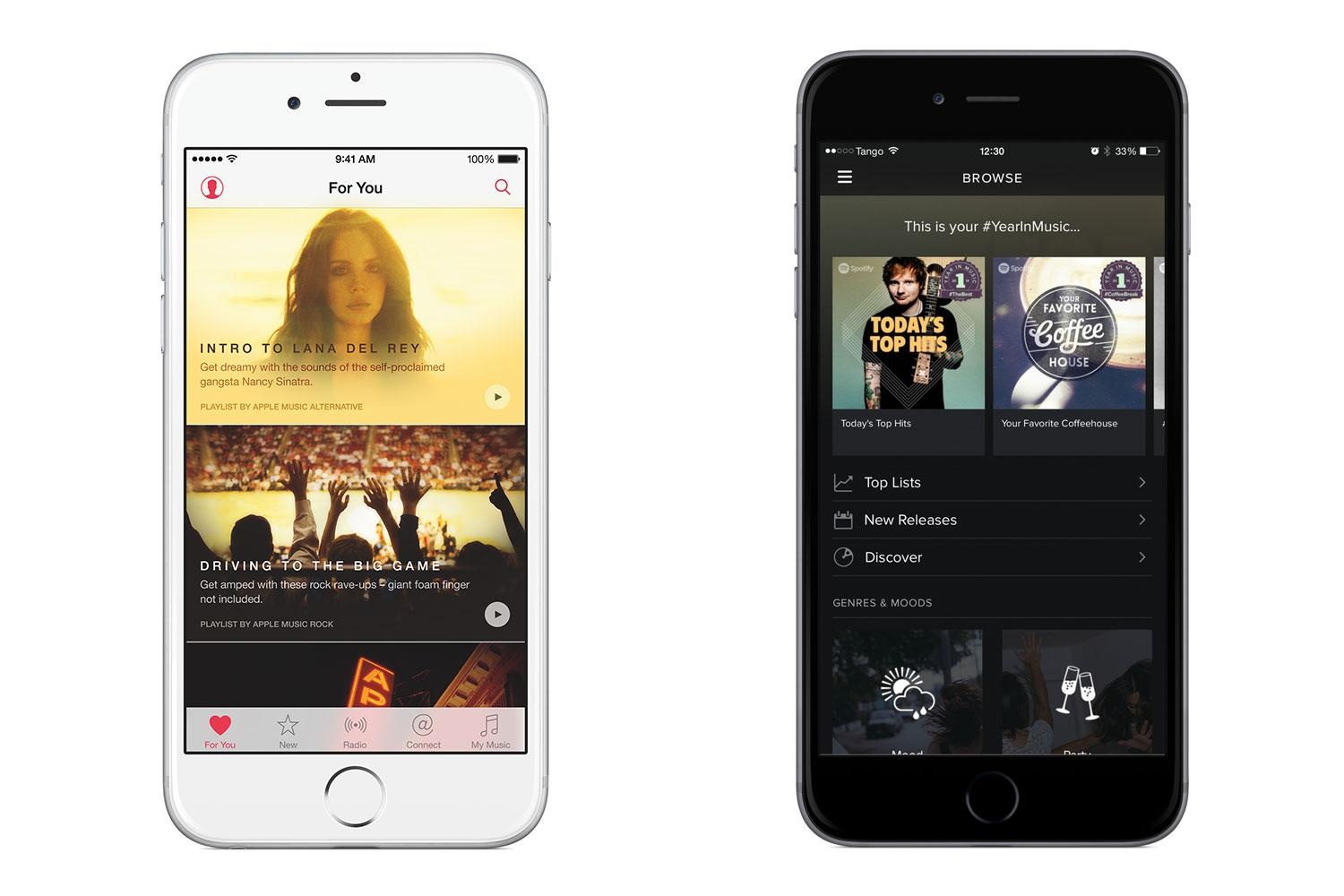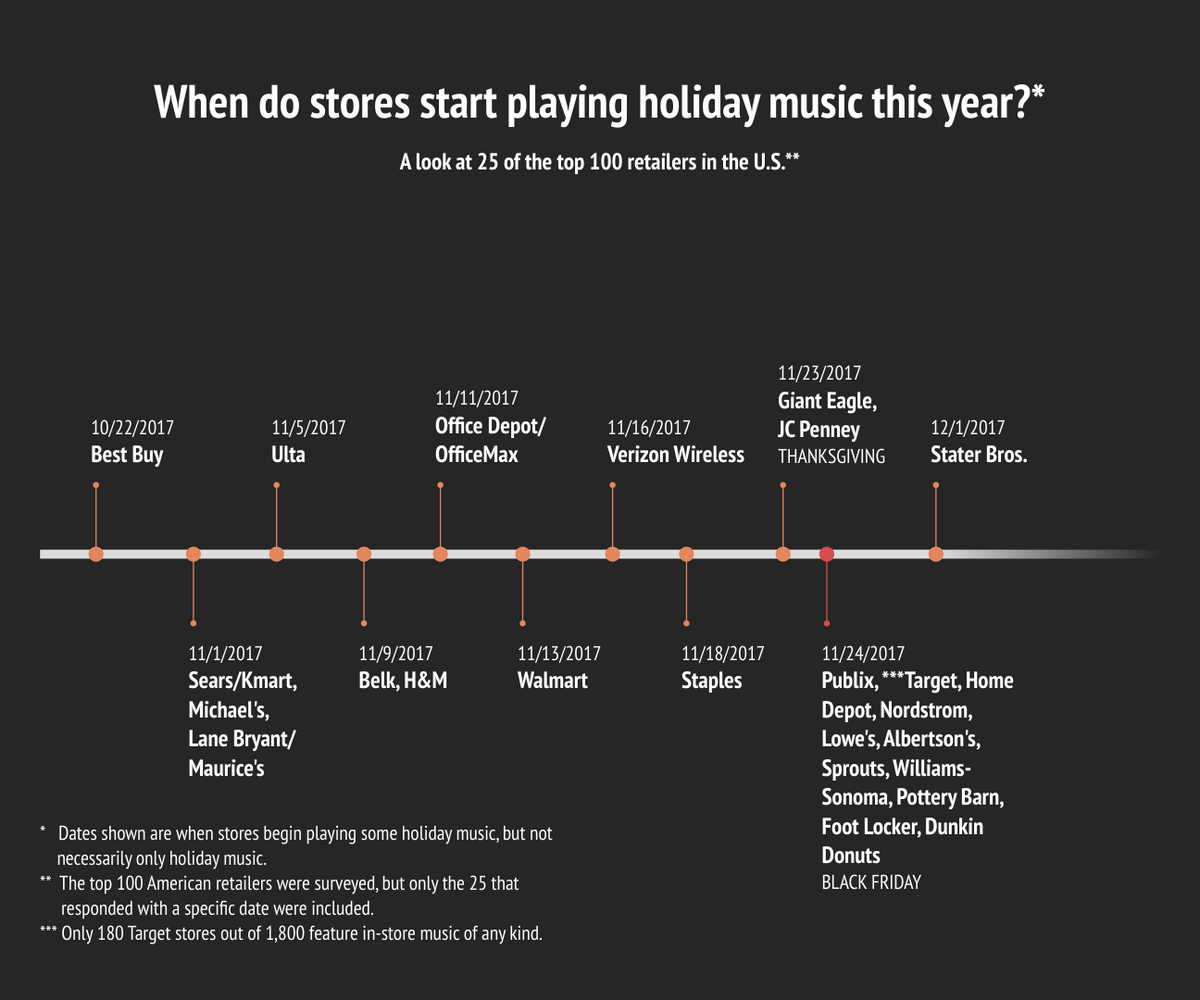All products featured are independently chosen by us. However, SoundGuys may receive a commission on orders placed through its retail links. See our ethics statement.
Podcast: It's beginning to sound a lot like Christmas
January 5, 2019

Check out the SoundGuys Podcast on iTunes! This episode “It’s beginning to sound a lot like Christmas” can be downloaded here. Below is a full transcript of the podcast. Be sure to subscribe to iTunes for more episodes!
Once upon a time, in town nearby you,
Christmas was coming, and all shoppers knew
That shrill tunes were coming in the stores and in cars
There was no escape in shops, malls, or bars
For some the music elicited great cheers
But for others the notes trigger dark feelings of past years
The scars of our past sear with some of these songs
Despite their intention to soothe and to calm
Okay, so maybe that’s a bleak picture but it’s actually more true than you might think for many out there. Holiday music can be torturous for… well, anybody. And we’re not just talking about being annoyed by the 18th play-through of Mariah Carey’s All I want for Christmas. Christmas music really can cause all sorts of psychological pain beyond the torture of repetition.
In fact, a growing number of psychologists agree that Christmas music probably isn’t helping many people stay merry this year because it can serve as a trigger for anxiety in many people. While you may have experienced this by being reminded of an ex, going back to a place that tortured you, or even having a visceral reaction to the mention of an old nemesis—anxiety can do some serious damage to your psyche.
If this were an isolated incident, that would be one thing, but according to a 2011 poll by Consumer Reports, 23 percent of Americans—nearly one in four – cite Christmas music as one of the most stressful parts of the holiday.
Why Christmas music is played everywhere

Easily the biggest issue we need to tackle here is just how inescapable this problem is, especially when you consider that you can’t rely on avoidance as a viable strategy. Think of it this way: in the US, Christmas efforts come earlier and earlier every year.
Do you remember the last time you went looking for Halloween candy and there wasn’t some sort of Christmas decoration around? What about a Thanksgiving that didn’t cram in the ads for Christmas sales or the Hallmark channel running anything but Christmas movies? Yeah, me neither.
So why the hell is this the case? As you can probably expect, that answer is money.
In our episode on everyday uses of sound, we mentioned that retailers have figured out that certain music playing over the loudspeakers will encourage shoppers to behave the way they want. This is also true with Christmas music… at least as long as it’s paired with other stimuli that remind the shoppers of Christmas.
By optimizing what people experience in the store, sales go up. When events like Christmas come around and people are looking to buy gifts anyway, the best way for the business to close the deal is to get them thinking about completing this task while at their store. They want us to take the cues of scents, sights, and sounds to come to the conclusion that it’s Christmas time, and that at Christmas you buy gifts. Our first special guest, Dr. Eric Spangenberg, Dean and Professor at the Paul Merage School of Business at the University of California Irvine., has more:
Environmental psychology and that’s how to the sights, the sounds, the smells, the elements of an environment, how do those impact people’s decision making, their attitudes, their affective responses and so forth. And so, that’s something that I’ve spent much of my career on and I actually began my experimental work with looking at the effects of music on shopping behaviors back in the late 1980’s as a graduate student.
Because sales go up when this happens, it’s no wonder that retailers want this period to last as long as possible. But it’s gotten to the point of ridiculousness.
Lily will get into that a little further on, but for now, we need to acknowledge that “Christmas creep”—you can’t see it, but I’m making air quotes—has been present for a long time, and it’s now at the point where it’s consuming other holidays. Christmas creep as you can probably figure out is the phenomenon where the Christmas season seems to start earlier and earlier each year.
We know that people have been making fun of this phenomenon since Hollywood and other profiteers have been shoving bad Christmas movies down our throats, but how bad has it gotten in recent years?

While we weren’t able to get hard points for 2018, in 2017 major big-box retailers like Best Buy started with their holiday music as early as October 22nd. Who knew that Nightmare before Christmas had the wrong holiday getting subsumed by the other?
Of course, retailers are playing with fire here. If people hear music too early, they get annoyed and put into a sour mood.
We do have specific cues that we associate with the season, and we want them to the congruous with the season. Different kinds of things evoke different kinds of responses and if you were to have the smell of a barbecue rolling through the Christmas season, the incongruity of that would actually distract and lead to a negative response, and so similarly, the sound or music that associated with the season can be something that can be congruous or incongruous. We actually have a script in our head or a playlist in our head that says Christmas.Does Christmas music have that positive effect, or does it start to create a negative affective response if we play it too soon. They’re negatively prompted. They’re like “it’s too early, It’s not Christmas yet. I don’t want this”
That’s probably why Black Friday and Cyber Monday sales don’t always use Christmas imagery or theming in advertisements. But once you’re at that store… get ready for some music to spur your subconscious into buying. Dr. Linda Blair, a clinical psychologist and Associate Fellow of the British Psychological Society, explains.
Retail atmospherics, which is all the different things in the shop which encourage you to buy. And it’s also on screen I’m afraid – you’re taking in all the stuff on the side that you don’t know you’re taking in. These factors can actually encourage you to buy, not just distract you from buying.
And from NBC News
Holiday music and smells can cause shopper to spend more time and money in stores. Slower tempo songs are especially good at this. Hearing Christmas music on repeat requires your prefrontal cortex to work hard to filter out the music, meaning you have less decision making power when it comes to opening your wallet.
Of course, none of that even touches how retail employees feel. Considering that they’re subjected to several hours of exposure every work shift for months, it’s easy to see how passions can be inflamed on the subject. For reference, every one of us here at SoundGuys has worked retail in the past, and we can tell you: it’s grueling.
The psychological damage/anxiety

If your go-to mall is anything like the one I grew up near, then you’ve likely heard Mariah Carey’s All I Want For Christmas at least 100 times – since yesterday. Although we communally commiserate and bond over our collective annoyance, scholars and psychologists alike have taken to speaking on the ill-effects perpetual Christmas music can have on your health.
Dr. Victoria Williamson, now at the University of Sheffield, shared in an interview with NBC that our enjoyment of Christmas music, like many other things, falls on a bell curve. At first it’s fine, then it build and builds until it’s great. But then you hit the other side of the bell. This is called the ‘mere-exposure effect.’” This reinforces the aphorism that “moderation is key,” because—while we may experience sprinkles of jubilant nostalgia upon first hearing a classic Christmas ballad underscored by faux sleigh bells—the unavoidable repetition ultimately yields contempt. Dr. Blair explains further.
It isn’t just the song, what’s quite interesting is, it’s the particular rendition of the song and a particularly irritating component for a lot of people is if the rendition is not one they know and like.
What’s more, the inescapable musical jingles can also exacerbate stress, says Williamson by which psychologist Scott Bea of the Cleveland Clinic concurs.
If people are prone to that perfectionism, hearing Christmas music too soon can create those associations and ramp up the tension before anything is really happening.
Even more dire, hearing Christmas music ad nauseum may beckon childhood trauma back to the forefront of one’s mind—literally: the prefrontal cortex, which is associated with memory and rests behind our foreheads, isn’t fully developed until age 25. This means memories of both the positive and negative variety remain salient in our minds well into adulthood. There are, however, ways to combat this stress response, as Dr. Linda Blair will share with us a little later.
The power of music is enticing enough, but as we’ve already said, context matters. And hearing not only the same songs over and over again, but during the same time of year can make those emotions that much more strong, as described, once again by NBC News:
Holiday music is also the only set of songs we hear exclusively in the same context every year. Making them especially nostalgia inducing.
It’s not like Arbor day has a popular playlist that makes you worry about cooking the perfect turkey or your father in law spending too much time in the bathroom.
If storefronts operate on the assumption that consumers generally experienced positive Christmas seasons during childhood, they can use Christmas music to their advantage. The war of attrition, or endless playing of Christmas tunes, wears down the prefrontal cortex’s inhibitions. This, in turn, deteriorates decision-making power and may compel us to purchase more product which relates to the same “retail atmospherics” that Dr. Blair explained earlier.
Although we may have focused on the more sinister side of unending Christmas music permeating retail spaces, the coin flips both ways. Said music can intensify feelings of stress and anxiety, but it can generate positive emotions, too. As with most everything in life, it’s context-dependent, and if Christmas music elicits feelings of glee and merriment, more power to you. There likely exists a Spotify playlist to complement your mood.
Our suggested solution

As Lily mentioned, it’s an important point to make that retailers aren’t trying to cause you anxiety. How is a sad and angry customer going to translate into sales? No, they do all of this in the hopes of making you happy. As Dr. Spegenberg said, retailers want to create a positive atmosphere that convinces you to spend more time there.
They’re just creating an environment that’s more enjoyable. It’s an environment that people want to spend time in that they want to revisit, and that they’re rewarding with their purchase behavior. And if you stop and think about it, what motivates you to get off the couch or get out from behind your computer screen and go to the store, and it should be, it’s a value-add.
It just so happens that holly, tinsel, and Bing Crosby make a lot of feel all warm and fuzzy inside. But what if the Christmas spirit really does bring up some not-so-pleasant memories for you? What can you do to help curb the anxiety that comes along with those negative memories?
Personally, my suggestion would be to try finding another ear-worm to take the place of that catchy Mariah Carey song stuck in your head. For me, that ear-worm is Miley Cyrus’s Party in the USA. Not sure if that’s better or worse, but hey, it works. But we thought we’d ask the experts that actually know what they’re talking about to try and figure out what might help and what won’t. Unfortunately, according to Dr. Linda Blair, the answer is pretty complicated as there isn’t a one-size-fits-all kind of therapy. Everyone is different.
Sadly, that’s what’s going wrong at the moment with a lot of therapy is that in an effort to “standardize” the therapies, they are becoming less individualized and therefore work less well. You have to tailor it because each of us is completely different.
So with that in mind, here are some ideas as to how to deal with the holidays. The first thing could try is to make new associations with the songs you don’t like, but you’ll probably need some help doing this.
We actually can train our brains, or I don’t know if we can do it ourselves, but it can be done by another entity where it’s conditioned response where we pair something positive with something that was previously negative, and if we do that often enough, it can end up eliciting a response that may be more positive in the future.
But what if Pavlov dogging yourself doesn’t work? What about immersion therapy? What if you just listen to the same song you hate over and over and over again until you numb yourself to its negative effects? Would that get the job done?
It would have to be done very sensitively. More than anything, you would need the motivation of the individual. So they’d have to want to use that particular way to try to re-associate the holiday with something more positive. And then, secondly, you’d have to engage their imagination in choosing the way they want to make that association. Some people, when we’re dealing with, say phobias, which is a similar situation, some people want to just face the phobia full on, 100% let’s do it, straight away, get there today and by tomorrow I won’t have it. Which is true, if it’s handled very carefully and they’re highly motivated. That’s called “flooding”, but most people would rather do what’s called desensitization which is to say, let’s just take tiny baby steps towards it, so you wouldn’t just play a song over and over again, you might just read the words without any sound at all for a little while. And then, when you felt ready to take the next step you would add music, or perhaps you would play the music and imagine the bad situation. And then imagine the good situation being like a screen photograph laid on tip of it, but then you would gradually actually put yourself in a better situation so you were experiencing it in three dimensions while hearing the music. So there’s so many ways you could do it. But you could certainly use music as a wonderful therapeutic aid.
Ok, forget all that. I’m just going to do all my shopping online because I just don’t want to deal with any of this. Sure, that might work for you right now at this moment, but that’s really not solving anything.
Certainly avoidance avoidance never works. Avoidance only increases your own isolation and that in turn can make you feel more depressed. So avoidance especially of social places is not a good idea. You can do two different things: Depending on what seems to be sensible to you. You ask them to turn the music down, if you’re very assertive. Second thing you could do is wear earphones and listen to your own music, or nothing, you know, just ear blockers. The third thing is, when you’re listening to the music, use what’s called paced breathing.
It should be mentioned that you should avoid shopping online only if the presence of music is preventing you from going to the store. Of course, you are welcome to shop online if you realize that its 2018, and going into stores is a pain in the ass. But don’t shop online simply to avoid the festive atmosphere. Of course, Dr. Blair mentioned headphones, and we might have a recommendation for you in that regard on Soundguys.com.

But what is this paced breathing Dr. Blair mentioned? She went into more detail, just in case you can’t avoid the stores.
When something aversive happens to us, cortisol levels spike inside, and that gives us that feeling of sort of distractibility and like we can’t focus – we’re actually focusing very well, but we’re looking for the danger – that’s what our cortisol is saying – there’s danger, find it…So what you do is dispel those physical symptoms, and you do that through the breath. So you breath in through the nose – gently, slowly, steadily – counting in your own mind, which of course also blocks out the sound – thousand one, thousand two thousand three thousand four. You hold it for the same count – you can carry on doing whatever it is you’re doing by the way – and then breath out through your mouth.15 of those breaths, between 15 and 20 which is about three minutes, seems to reduce the cortisol spike, it stops the adrenaline surges, and it just settles the brain.
So there you go. If you find yourself annoyed, just remember a little relaxation and meditation can go a long way. And if you or someone you know is really struggling this holiday season, nothing is more helpful than speaking with a professional. As Dr. Blair said, everyone is different and listening to our podcast won’t solve everything, no matter how amazingly, fun, hilarious, informative, sarcastic, and awe-inspiring it is.
Conclusion

There is, of course, another solution, and that’s to make your own playlist. To that end, I personally suggest finding covers or songs in a different genre that keep the yuletide bright. Like the xennial — ugh — that I am, that usually means some blend of punk and metal. You can also find more off-color classics from Tom Waits, Weird Al, The Killers, The Pogues, and Diamond Rugs to name a few.
For example, Bad Religion has a whole album of Christmas Carols, and there’s plenty of metal covers of holiday tunes on YouTube by aspiring artists. Clever re-imaginings of songs with differing tempos, lyrics, and moods can be more fun. They also stand a good chance of breathing a little new life into things you’ve heard a thousand times before. For example, we love the Small Town Titans’ rendition of You’re A Mean One, Mr. Grinch.
That’s it for this episode of the SoundGuys podcast, thanks for listening! We hope that we’ve armed you with enough knowledge to become exactly as grinchy as the rest of us, and that… well, you find a way to be happy this holiday season. We genuinely want you to be able to enjoy yourself, and we’re very grateful that you’ve joined us today. If you like Christmas music, more power to you! There are lots of people like you, and it’s good to be happy about music! All we ask is that you consider your party guests and that may be a little tasteful playlist tinkering is in order if you know you’re about to have people over that have been bombarded by Mariah Carey all day.
The SoundGuys podcast is produced by Adam Doud, written by Adam Molina, Lily Katz, Chris Thomas, and edited by Adam Doud. Special thanks go out to Dr. Eric Spengenberg and Dr. Linda Blair, NBC News, CBS News Philadelphia, and of course the Small Town Titans.
From all of us here to you, happy listening, and happy holidays!